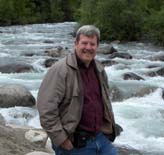Dr. Robert Traver Shares His Expertise on Two Government Committees

A federal appointment ends and a state appointment begins for Dr. Robert Traver, Director of the Villanova Urban Stormwater Partnership (VUSP) and a professor in the Department of Civil and Environmental Engineering.
For the past two years, Dr. Traver served on the National Research Council's Committee on Reducing Stormwater Discharge Contributions to Water Pollution, which, at the request of the U.S. Environmental Protection Agency (EPA), was formed to assess the EPA's regulatory framework for stormwater. According to the committee's report, published in October, that framework needs to be overhauled.
Stormwater is a critical component in the health of a river system. As impervious surfaces replace water-retaining forests and agricultural land, stormwater travels more quickly and in greater quantity into waterways, where it deposits pollutants and causes erosion. Current regulations do not adequately address this degradation of the water quality and habitats of the nation’s waters.
The committee made several recommendations. First, stormwater and other wastewater discharge permits should be based on watershed, not political, boundaries. Second, the EPA's program should focus more on the treatment, reduction, and prevention of flows. "Because the increased flow increases erosion in the stream channels, it should be treated as a pollutant," Dr. Traver said.
Finally, if researchers are to develop a more sustainable approach to stormwater management, they need to learn more about how devices such as green roofs, porous pavements, and bioinfiltration sites work. VUSP research contributes to this body of knowledge.
Dr. Traver is now beginning a two-year term on Pennsylvania’s Water Resources Advisory Committee. Appointed by the Acting Secretary of the Pennsylvania Department of Environmental Protection, members will provide advice on the impact of regulations, policies, and control techniques pertaining to water-resources management. Dr. Traver sees this appointment as "an opportunity to contribute to the model of sustainability advanced by our University President."
